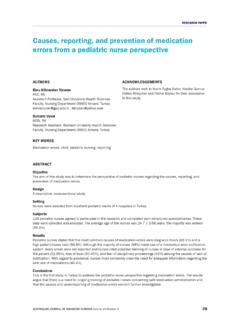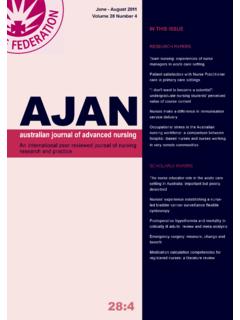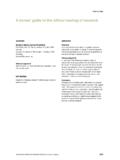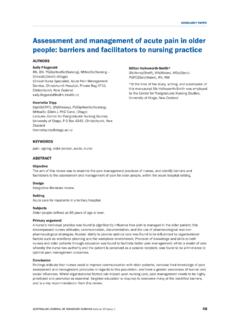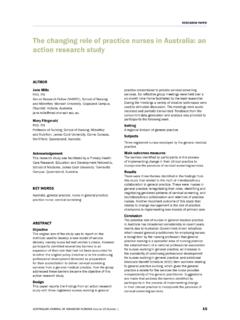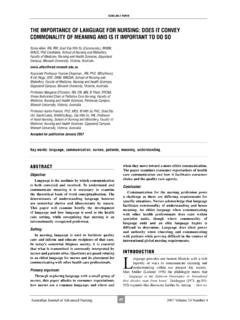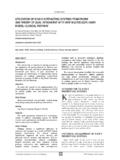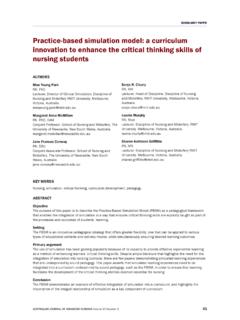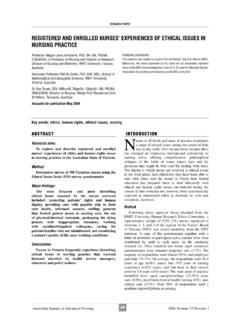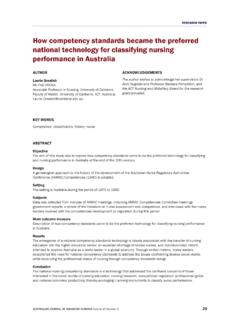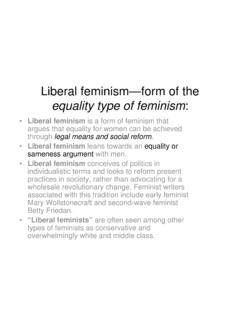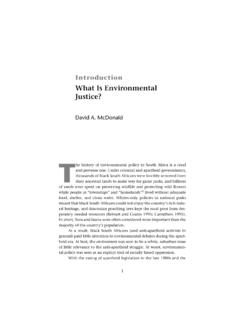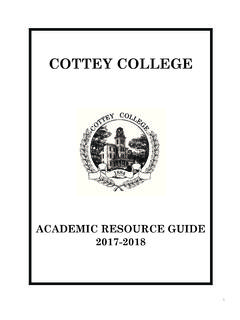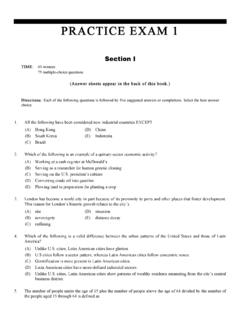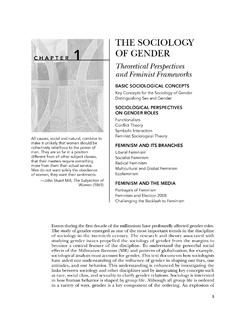Transcription of A CASE FOR CHAOS THEORY IN NURSING
1 Australian Journal of Advanced NURSING 2001 V olume 18 Number 3A B S TR A C TThis paper addresses the question of why nursesshould understand CHAOS THEORY . A critique of theliterature is used to demonstrate how CHAOS THEORY hasbeen utilised in a number of disciplines, includingnursing. Possible applications of CHAOS THEORY innursing are proposed in order to demonstrate whereit might assist nurses, in particular researchers,educators and policy makers. The appropriateness ofthe application of CHAOS THEORY as a framework forknowledge generation is also discussed. I N T R O D U C T I O NChaos THEORY has been developed from thedisciplines of mathematics, computer science andmeteorology and stems from earlier work by anumber of mathematicians.
2 During the last two decades ithas been identified as one of the new sciences (Gleick1987). CHAOS THEORY is a science of the global nature ofsystems which enables simple mathematical equations tomodel complex systems. Small differences in input canhave dynamic responses in output. This phenomenon hasbecome known as sensitive dependence on initialconditions (Gleik 1987 ). NURSING practice involves complex dynamic systemsand it can be argued that it would be amenable to analysisusing the methods of CHAOS THEORY . However, few nursingarticles use CHAOS THEORY as a framework for understandingthe NURSING context. This paper will argue that nurseswould benefit from understanding CHAOS THEORY andthrough its application gain a greater understanding oftheir practice.
3 A number of questions are addressed: Whatis CHAOS THEORY ? How has CHAOS THEORY been appliedwithin the NURSING literature and is this an appropriate useof the THEORY ? How can it assist NURSING ? Is it anappropriate theoretical construct for NURSING knowledgegeneration?Why should nurses understand CHAOS THEORY ?The question of why any researcher needs tounderstand CHAOS THEORY is one of importance. It can beargued that in order to gain new insights into phenomenaof interest, underlying frameworks of analysis have to beunderstood. This is not unique to NURSING . The newersciences, such as quantum mechanics and CHAOS theoryhave been, and will increasingly be, used as such aframework.
4 CHAOS THEORY is argued by a number of nurseresearchers to offer a new paradigm science perspectiveand to provide new ways to examine the world (Copnell1998; Pediani 1996; Barker 1996; Coppa 1993; Phillips1991). The THEORY must be understood before it can beapplied to any NURSING context. Without this understandingtheory will be adopted without due regard to theSCHOLARLY PAPER14 Margaret Lett, RN, BAppSc (Adv Nur), MNSt, MRCNA, isLecturer in NURSING , Australian Catholic University, St Patrick sCampus, Fitzroy, Victoria, AustraliaAccepted for publication November 2000A CASE FOR CHAOS THEORY IN NURSINGKey Words: CHAOS THEORY , NURSING , knowledge development, nonlinear systemsAustralian Journal of Advanced NURSING 2001 V olume 18 Number 3applicability of the concepts and therefore informeddiscussion, evaluation or critique becomes impossible.
5 New applications for CHAOS THEORY are being proposedand these will directly influence the knowledge base andpractice of nurses. CHAOS THEORY has already been used asa framework for research in areas such as physiology,demographics, economics and business planning, theologyand leadership THEORY . Some of these have a direct effecton is CHAOS THEORY ? CHAOS THEORY explains how complex systems (1987) believes that CHAOS is not simple anarchy butthat complex systems follow some very simple changes can result in large differences, which arenot proportional to the magnitude of the change. Thiscreates a nonlinear relationship. For example, a smallchange in wind turbulence can lead to large changes inweather in another area.
6 These charges are not random butcan be predicted using computers and simple mathematics. The NURSING literature on CHAOS theoryOn searching the computerised library databases forchaos THEORY in NURSING , 49 articles were highlighted. Anumber of these had to be excluded on the grounds thatthey were not NURSING related. Excluded were articles inthe areas of homoeopathy, chiropody and rehabilitationcounselling. A PhD thesis in NURSING was also excluded onthe grounds of availability. The earliest article found waspublished in 1991 and since then there has been aprogressive increase each year. A selection of articles,from the Journal of Theoretic and Applied CHAOS inNursing , were included in this review.
7 This particularjournal is, as the name suggests, a very specialised journaldevoted to CHAOS THEORY and its application to NURSING . Thefirst issue of this journal appeared in 1994. Murray (1997),supports the view that there is little NURSING literature onchaos THEORY and has stated that there is minimal NURSING -related material which deals with CHAOS , complexity ornonlinear dynamics. This could be used as supportingevidence for the notion that there is therefore no need fornurses to study CHAOS THEORY , but this is a short-sightedview. More articles are appearing each year and at thisstage the possibilities CHAOS THEORY offers NURSING havenot been fully 1991 nurses who have made a contribution to thenursing literature on CHAOS THEORY include Murray (1997,1992), Phillips (1992, 1991) and Vicenzi (1994) andVicenzi et al (1997).
8 In 1991, Phillips discussed thepossibilities CHAOS THEORY offered to NURSING research andparticularly qualitative research. This discussion wasbased on the opinion that an understanding of naturalisticinquiry and nonlinear statistical models will enable nurseresearchers to gain insights into the instability andunpredictability of systems. This article provoked a rebufffrom Puskar et al (1992) who reminded Phillips that chaostheory was a mathematical concept, and that they believedthe greatest contribution that CHAOS THEORY could make tonursing research was in quantitative designs. Theirreasoning would appear sound as statistical modelsprovide quantitative data that enable researchers to modelcomplex chaotic systems using simple mathematicalequations.
9 Phillips (1992) further explored CHAOS THEORY inhis response to this rebuff and stated that they had failed toappreciate the beauty of nature s CHAOS , and had notunderstood linear article by Murray (1992) discusses the need for acritical care curriculum to include CHAOS THEORY . Murray(1992) has drawn upon the literature that uses CHAOS theoryas a way to understand complex systems. He highlightsthe use of the THEORY by Goldberger et al (1990) to explainphysiological systems but also asks the question: Howmight CHAOS THEORY be useful for NURSING within criticalcare? He subsequently identified areas such asepidemiology, physiology and risk assessment. While atpresent he is unsure of CHAOS THEORY s usefulness due to alack of available research evidence, he stated that nursesat least should have CHAOS THEORY as part of theirknowledge base in order to critique the literature.
10 Hence,he believes that CHAOS THEORY should be included in thecritical care curriculum. Analysis of the more recent NURSING literature suggeststhat CHAOS THEORY has moved from being a possibility fornursing, to a theoretical approach that has been applied tonursing practice. The THEORY has been applied in threediscrete ways by various disciplines, including the purposes of this analysis three categories have beenadopted; the mathematical constructs, the properties thatchaotic systems exhibit (the tenets of the THEORY ) and thenotion of CHAOS . Different NURSING views on CHAOS theoryTHE MATHEMATICS OF CHAOSC omplex chaotic systems can be computer-modelledusing a number of mathematical equations.
